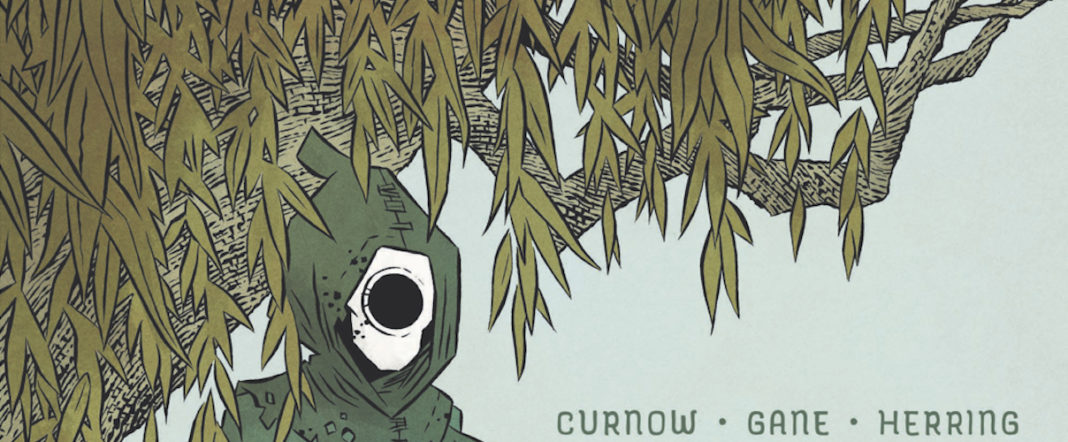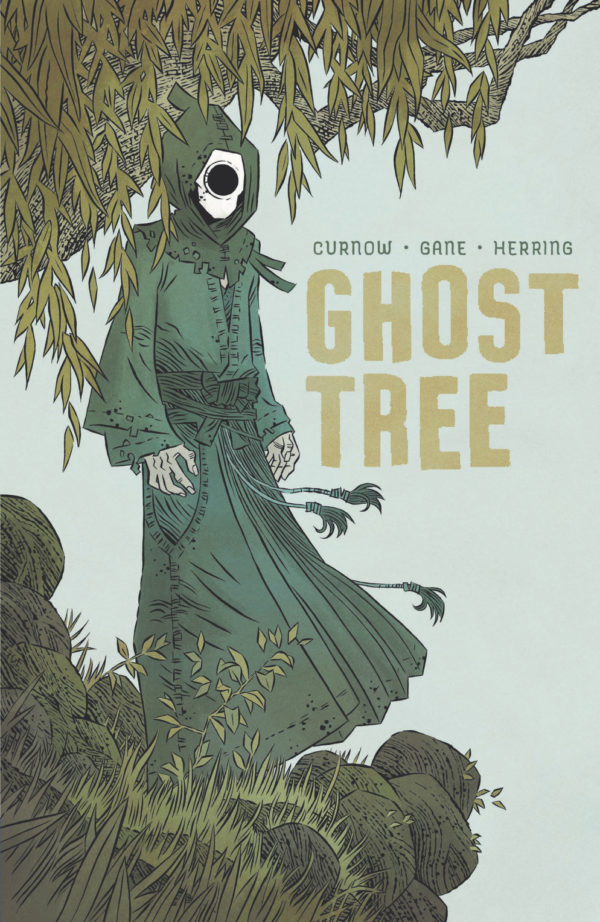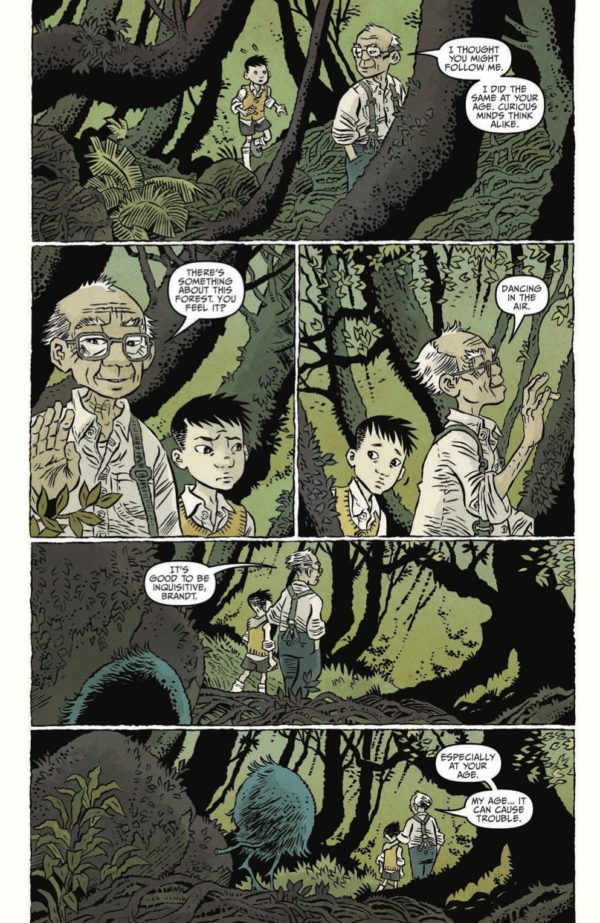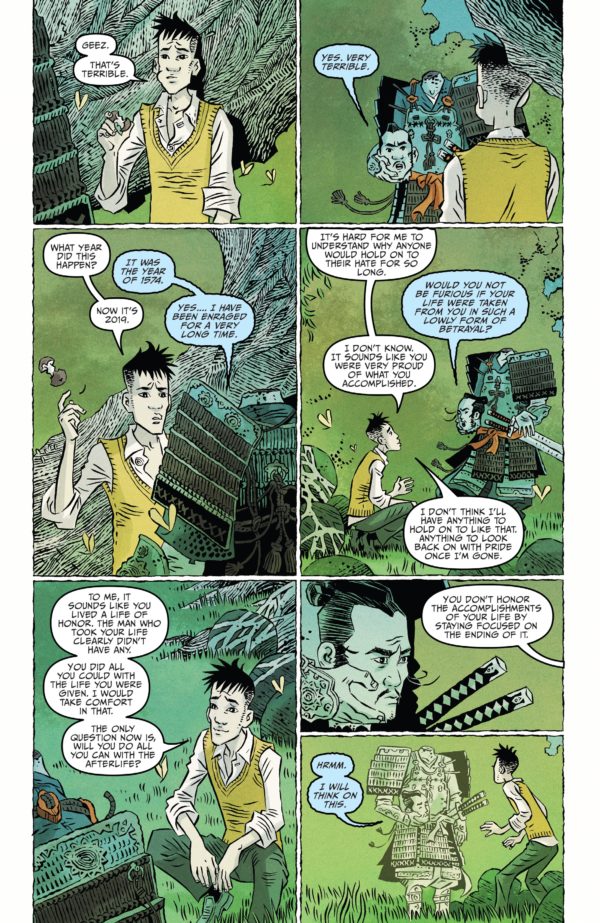Ghost Tree
Written by Bobby Curnow
Illustrated by Simon Gane
Colored by Ian Herring and Becka Kinzie
Lettered by Chris Mowry
IDW Publishing
I reviewed the first issue of Ghost Tree when it came out back in April but even though I enjoyed it and recommended it, I don’t think I had any idea where it would go. Certainly where it ended up going is not what I would have envisioned. Too often I find that genre-oriented comics that start out with a human focus, spending their start time exploring characters and themes, eventually end up following the tropes that comics have established for genre narratives. They usually end up favoring big battle scenes and trite dialogue, dropping the previous emphasis that attracted me in the first place in favor of predictable action and good versus evil scenarios, perhaps peppered with some plot mystery that needs to be solved. I didn’t know if this was where Ghost Tree would end up, but I probably imagined it would.
Full disclosure: Ghost Tree does have a battle scene in it, but I wouldn’t describe it as a big one. Regardless, it never takes the easy way out and embraces good versus evil as its central theme. And it never shifts the focus to action. Instead, it expands on what it starts with, and explores its themes in a thoughtful way that is never bogged down in any plot mysteries. Ghost Tree, as it turns out, is refreshing from start to finish
In Ghost Tree, Brandt travels to Japan to visit his grandmother at her house in the forest, along with his cousin. When Brandt was a kid, he promised his grandfather that he would come back 10 years after his grandfather’s death. The life that has unfolded hasn’t been a tragedy for Brandt, but it hasn’t been what he dreamed of. His marriage is failing and he hasn’t much passion for reviving it, so he is wandering and lost in the universe. He arrives to find his grandmother to be a bit stand-offish and dismissive of the memory of Brandt’s grandfather, and as he lurks around the house, he encounters reminders of memories he let go.
A walk in the forest takes him to the tree in front of which he made his promise to his grandfather, and that’s where memories become tangible. His grandfather is there, waiting for him, and Brandt discovers a secret about his family and that tree in regard to numerous ghosts that haunt the forest there. As someone who can see the ghosts, Brandt embraces his mission — to help them — and begins to settle into a role as therapist for them.
But there are other things going on. A mysterious monster appears and threatens the ghost community’s feelings of safety around the tree. And Brandt encounters something very unexpected — the ghost of one of those memories he had let go of, giving him the opportunity to reconnect with an important aspect of his past and get lost in thoughts of “what if” at the expense of his actual life.
Ghost Tree might involve spirits from the afterlife and a scary demon-like creature, but it’s not a horror story in the slightest. It’s actually an introspective and charming meditation on familial dysfunction and regret in which mistakes and misfortunes become focal points that stretch from the past and into the future, across generations, engulfing the opportunity for love to take a proactive stance in the present of anyone’s life. It’s about coming to terms with what has already happened, reclaiming yourself, and taking charge of your emotional path.
In bringing this story to life, writer Bobby Curnow creates well-realized characters and has an ear for genuine dialogue, while Simon Gane really brings together the two opposite worlds that he needs to illustrate — the emotional real world and the intangible supernatural one — in a way that makes the former magical and the latter down to earth. Ghost Tree is a wonderful concoction that defies your expectations by exuding warmth and charm and depicts a universe that in its lack of fairness challenges your ability to push back bitterness and still live a good and full life.











